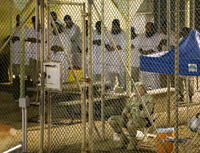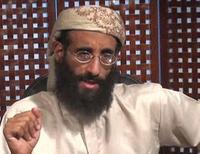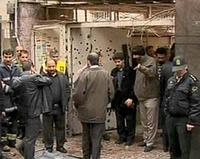-
U.S. anxious over terror attacks during holidays

Counterterrorism officials are tracking threats to the United States and Europe from al Qaeda and affiliated groups during the holiday season; the FBI and DHS have alerted state and local law enforcers to be wary of suspicious behavior and to change security measures regularly to interfere with any terrorist plans; the warning was sent in a bulletin Wednesday; there is specific intelligence of other attacks being planned against Europe during the holiday season, according to U.S. officials say
-
-
King: House Homeland Security panel will be vigorous, demanding
Long Island congressman Peter King will take over as the new chair of the House Homeland Security Committee — New York state’s lone chairman in the new Congress (and even this only until 2012, when he will be term-limited out of the chairman’s chair, unless he gets a waiver from the Republican leadership); he has been a vocal critic of the Obama administration on a number of issues over the last two years, and says he plans for a much more vigorous — and possibly controversial — committee when he re-takes the gavel; King expressed concern about Obama administration officials’ response to what he calls the “incalculable damage” caused by the massive document leak released by WikiLeaks; “Considering how fast they moved [to file a laswsuit] on Arizona’s immigration law and how determined they were to move against our CIA agents—- there is definitely something missing here,” he asserted
-
-
Gitmo repeat offender rate rises sharply

The number of Guantanamo Bay detainees returning to the battlefield continues to grow at an extraordinary rate; new report from the director of U.S. national intelligence says that 150 of the 598 detainees who have been transferred out of Guantanamo’s detention camps, about 25 percent, are now confirmed or suspected of returning to the battlefield; of that group, 13 are dead and 54 are again in custody, while 83 remain at large; CIA director Leon Panetta said the biggest concern is ex-detainees who not only return to the battlefield but take up leadership positions within al Qaeda, a reference to the terror group’s branch in Yemen, where at least two leaders are Saudis and former Guantanamo detainees
-
-
Judge throws out suit aiming the bar U.S. from killing al-Awlaki

Anwar al Awlaki, the New Mexico-born fire-brand Islamic cleric, from his hideout in Yemen, has been urging Muslims to kill Americans; the Obama administration has placed him on its capture-or-kill hit list, and U.S. special forces and intelligence operatives have been searching for him; the cleric’s father, Nasser al Awlaki of Yemen, sued the U.S. government, arguing that international law and the Constitution prevented the administration from unilaterally targeting his son for death unless he presents a specific imminent threat to life or physical safety and there are no other means to stop him; the suit also tried to force the government to disclose standards for determining whether U.S. citizens like his son can be targeted for death; a federal judge has thrown out the law suit, writing in his opinion: “The serious issues regarding the merits of the alleged authorization of the targeted killing of a U.S. citizen overseas must await another day or another nonjudicial forum”
-
-
Al Qaeda seeks to surgically implant bombs into "martyrs'" bodies
Al Qaeda operatives are looking for ways to defeat the growing number of full-body scanners at airports around the world; they recently tried to deploy a pair of kamikaze canines on a U.S.-bound airplane from Baghdad airport; the bombs were placed inside the dogs’ bodies, but the plot failed because the bombs were so poorly stitched inside the dogs, that the dogs died; Web sites affiliated with al Qaeda are now calling of doctors and scientists sympathetic to the organization to help it devise ways for surgically stitching bombs inside human beings, to usher in what one of the organization’s operatives calls a “new kind of terrorism”
-
-
Portland reconsiders relations with FBI's terrorism task force
Five years ago the mayor of Portland, Oregon, decided not to participate in the FBI’s Joint Terrorism Task Force because of concerns about civil liberties; the past weekend’s capture of a 19-year old after he attempted to detonate what he thought was a vehicle bomb near a tree-lighting ceremony in Portland’s Pioneer Courthouse has led the mayor to reconsider his decision
-
-
Exploding garbage truck in Florida not act of terrorism
An explosion on an Orlando, Florida garbage truck raise fears that the garbage-truck crew had stumbled on an underground bomb factory which had foolishly thrown some of its products in the rubbish — or that the explosion presaged a fearful terror wave campaign of exploding bins or municipal vehicles; police investigation finds that the explosion was caused by a local resident foolishly disposing of a pressurized container in their garbage
-
-
Israeli agents kill yet another senior Iranian nuclear scientist

Israel’s covert campaign to derail Iran’s nuclear weapons program continues unabated; the latest chapter: a senior Iranian nuclear weapons scientists, Majid Shahriari, was killed, and a fellow scientists seriously injured, when two groups of operatives on motorcycles approached their cars on busy Teheran streets and opened fire from automatic weapons; the covert campaign has already claimed more than a dozen leading nuclear scientists and engineers (five of whom killed in Teheran, the others while traveling in Europe), as well as several Revolutionary Guard senior officers associated with the nuclear weapons program; in addition, nuclear weapons-related warehouses and depots, located in Revolutionary Guard military bases, were blown up, and disguised nuclear technology shipments to Iran were seized in ports in Europe, America, and Asia; on 16 November, Iran temporarily shut down its uranium enrichment facilities after the Stuxnet virus, designed by the secretive Unit 8200 of Israel’s Military Intelligence, destroyed hundreds of centrifuges
-
-
"Whoever needs to know, knows": Israel intensifies covert campaign against Iran
Israel believes that the best guarantee of its security is the ability to maintain its regional nuclear monopoly; to that end, it used covert means to stop the nuclear weapons programs of Egypt (1960-63) and Iraq (1970s-1980s); it also used less covert means, such as attacking and destroying nuclear reactors in Iraq (1981) and Syria (2007); if the past is an indication, Israel will see to it that Iran, too, will find its effort to acquire the bomb to be prohibitively costly, very painful — and, ultimately, futile
-
-
FedEx loses -- then finds -- radioactive rods

The shipment of radioactive rods sent from Fargo, North Dakota, to Knoxville, Tennessee, posed little threat, but its misplacement underscores the need to track low-hazard materials that could be used in small-scale terrorist attacks, experts say; as al Qaeda has shifted its tactics from 9/11-scale attacks to smaller attacks which aim to create fear and do economic damage, there is growing concern about low-radiation materials which are widely used in research, medical facilities, and industry; such materials may not be suitable for a nuclear bomb, but could be used to create “dirty bombs,” which cause fewer casualties but can release hazardous materials when they explode
-
-
Police radar can identify suicide bombers
The radar guns police use to spot speeding motorists fire microwave pulses at a car and measures the Doppler shift of the reflected signal to calculate its velocity; researchers found that the strength and polarization of the reflected signal — the “radar cross section” — can also measure the reflected signal created by the most common arrangements of looped wiring typically used by suicide bombers
-
-
Behavior-based solution keeps airports secure, passengers' privacy intact
Israeli company WeCU says its behavior-based security solution addresses many of the problems now encountered at U.S. airports; the WeCU concept exploits human characteristics and behavior: when a person intends to carry out a particular activity or has a significant acquaintance or involvement with a subject, he carries with him information and feelings that are associated with the activity or the subject; the WeCU system identifies this associative connection by actively exposing the person being screened to stimuli targeted at a specific threat, followed by detection of the person’s physiological reaction, or response, to the stimuli through nonintrusive biometric sensors; the system detects the individual’s reaction without his or her knowledge and without requiring their cooperation, and without interfering with routine activities
-
-
Report: Terrorists target the Reichstag
Terrorists may have been planning an attack on the Reichstag, the home of the German parliament and one of the most popular tourist destinations in Berlin. Two suspected culprits are already believed to be in Berlin.
-
-
Qaeda's new tactics: heavy economic damage, low-cost operations
In a detailed account of its failed parcel bomb plot three weeks ago, al Qaeda’s branch in Yemen said late Saturday that the operation cost only $4,200 to mount, was intended to disrupt global air cargo systems and reflected a new strategy of low-cost attacks designed to inflict broad economic damage; the organization said the fear, disruption, and added security costs caused by the packages made what it called Operation Hemorrhage a success
-
-
Germany braces for terrorist strikes
Germany is bracing for possible terrorist attacks amid growing signs that Islamic extremists are preparing at least one assault somewhere in the country in the coming weeks, possibly in the capital, Berlin; authorities in Berlin are racing to track two suspected suicide bombers believed to be planning to strike a prominent location; police are combing through travel and visa records and scrutinizing arrivals from the Mideast and South Asia as they hunt the pair; meanwhile, German officials say that a second group of terrorists is reported to be planning to travel to Germany in the coming weeks to launch a small-arms attack on one or more urban centers in the next three months
-
More headlines
The long view
What Does Netflix’s Drama “Adolescence” Tell Us About Incels and the Manosphere?
While Netflix’s psychological crime drama ‘Adolescence’ is a work of fiction, its themes offer insight into the very real and troubling rise of the incel and manosphere culture online.
